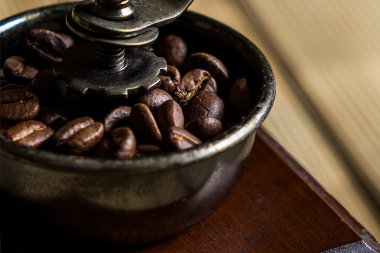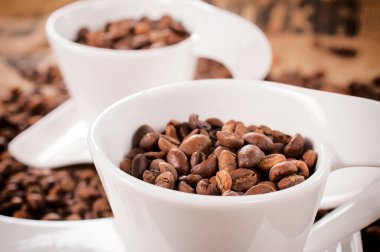Kopi luwak is a type of coffee that comes from South-East Asia. It is made from coffee beans, but these must previously have been extracted from the faeces of the muzanga - an animal of the weasel family. Graces are also known as civets, while their local name luwak explains perfectly well the origin of this elite coffee.
Grace muzang - civet - Louvre
 Grace is an interesting animal. Yes, he eagerly reaches for coffee berries, but if his digestive tract can handle their flesh perfectly, he is not able to digest the seeds themselves. They are digested by digestive enzymes and even fermented lightly, but tickling can do nothing more with them, so the grains pass through the digestive tract to be excreted. What's more, tickling is a rather choosy animal - it reaches only for the best of fruits. After passing through its digestive tract, the seeds lose their characteristic bitter taste. Once they have been cleaned, the beans must be processed, but this operation is carried out using traditional methods only. The Louvre is produced mainly on Indonesian islands, although it is also produced in Vietnam and the Philippines.
Grace is an interesting animal. Yes, he eagerly reaches for coffee berries, but if his digestive tract can handle their flesh perfectly, he is not able to digest the seeds themselves. They are digested by digestive enzymes and even fermented lightly, but tickling can do nothing more with them, so the grains pass through the digestive tract to be excreted. What's more, tickling is a rather choosy animal - it reaches only for the best of fruits. After passing through its digestive tract, the seeds lose their characteristic bitter taste. Once they have been cleaned, the beans must be processed, but this operation is carried out using traditional methods only. The Louvre is produced mainly on Indonesian islands, although it is also produced in Vietnam and the Philippines.
The unusual acquisition process makes the zipper copy is considered to be the most expensive coffee in the world, and the price per kilo can be as high as a thousand euros. It cannot be otherwise, however, since the world production of this species does not exceed 400 kilograms. Copies of the zipper are most often sent to the United States and Japan, although it appears more and more often in other countries, including Poland.
Coffee copy slider
 If we wanted to explain the phenomenon of its popularity, we would have to pay attention above all to the grainy, slightly sweet aroma of this beverage.
If we wanted to explain the phenomenon of its popularity, we would have to pay attention above all to the grainy, slightly sweet aroma of this beverage.
It is not without significance, however, that the coffee has a mild taste, almost free from the characteristic bitterness. Even before the first sip, however, you should get used to the idea that this coffee came to us because someone was dressing up in the droppings of a small animal.
Copies the manure slide
 Civets are animals that look a bit like our cats. They are known for their excellent but picky taste, since they reach only for the most beautiful coffee berries. If the fruits are unripe or mouldy, they will not even look at them.
Civets are animals that look a bit like our cats. They are known for their excellent but picky taste, since they reach only for the most beautiful coffee berries. If the fruits are unripe or mouldy, they will not even look at them.
Civets digest only the flesh of the fruit, while its grains are excreted almost intact. When the grain is excreted, people start working. Their main task is to harvest, wash and lightly roast the seeds. Already after processing, the beans are more black and brittle than those typical of traditional coffee.
Phenomenon of coffee copy luwak
The coffee copy of the Louvre is so interesting that it has already been scientifically analyzed. The research ordered to pay attention to the micro-depth slider, which is characteristic for seeds. They are only visible under the microscope, it is assumed that they resulted from the action of digestive enzymes of civets, which led to the violation of the structure of proteins. This slight over-digestion of the grains should be identified with the aroma typical for the copy of the Louvre, which may also be responsible for the fact that part of the gentian has been removed from the grains.
 The popularity of copying the zipper in the richest countries of the world means that there is no shortage of manufacturers specializing in imitating its taste. Beverages of this kind have a slightly lower price, so it is no wonder that they tempt tourists. It is best seen in Indonesia, because there in many stores there is a pseudo-coffee copy of a zipper, which has nothing to do with its noble counterpart. Some products do indeed contain individual original grains, but there are also many that do not have any original additions.
The popularity of copying the zipper in the richest countries of the world means that there is no shortage of manufacturers specializing in imitating its taste. Beverages of this kind have a slightly lower price, so it is no wonder that they tempt tourists. It is best seen in Indonesia, because there in many stores there is a pseudo-coffee copy of a zipper, which has nothing to do with its noble counterpart. Some products do indeed contain individual original grains, but there are also many that do not have any original additions.
It is worth remembering that for a real copy of the zippered zip, a mild taste with a well felt note of chocolate and caramel is characteristic. It is also worth noting that already after swallowing the coffee does not remain in the mouth the typical bitterness of this beverage. The fermentation process taking place in the intestines of the civet is responsible for all this, and it is during this process that the protein present in coffee beans is first broken down and then washed away.















